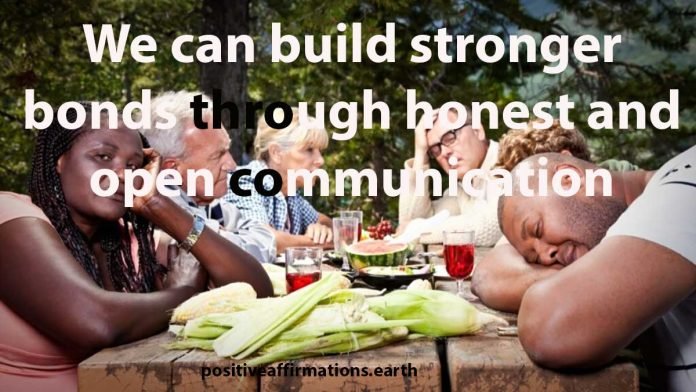Functional and dysfunctional families differ in several ways. A functional family is characterized by effective communication, positive reinforcement, mutual respect, and support for individuality. Members of functional families are open to each other’s perspectives and opinions, and they work together to resolve conflicts. This type of family fosters healthy relationships, and members feel secure, loved, and appreciated. Parents in functional families create a safe and nurturing environment for their children, and they encourage them to pursue their goals and aspirations. The members of functional families are typically self-reliant, confident, and emotionally stable.
On the other hand, a dysfunctional family is marked by poor communication, emotional neglect or abuse, inconsistent parenting, and a lack of boundaries. Members of dysfunctional families often struggle with trust issues, low self-esteem, and difficulty forming healthy relationships. Family members may be critical of each other, engage in destructive behaviors, and have a tough time expressing their feelings. In a dysfunctional family, conflicts may be ignored, dismissed, or managed in unhealthy ways, leading to ongoing issues and resentment. Children raised in dysfunctional families may develop emotional and behavioral problems and struggle with social relationships as they mature.
In this article we will first look at some of the different family configurations that are a part of society today and then explore what it is that leads to family dysfunction. We will then explore some techniques to address dysfunction.
Different Types of Family Configurations
- Nuclear Family: In a nuclear family, the parents are typically the primary caregivers and role models for their children. This type of family structure can offer stability and consistency, as the children are raised in a home with two parents who share the responsibilities of parenting. However, it can also be challenging for working parents who may struggle to balance their careers and family responsibilities.
- Single-Parent Family: Single-parent families face unique challenges, such as financial stress and emotional strain. The parent may have to juggle multiple roles and responsibilities, such as working to support the family while also being the primary caregiver for their children. However, single-parent families can be just as loving and supportive as other types of families.
- Extended Family: An extended family can offer a sense of security and support, as multiple family members share the responsibilities of raising children and caring for elderly relatives. However, conflicts can arise when different family members have different opinions on how to raise children or manage certain situations.
- Childless Family: Couples who choose not to have children may have more time and resources to invest in their careers, hobbies, and other interests. However, they may also experience social pressure or judgment from others who view having children as a societal expectation.
- Blended Family: Blended families can offer a unique opportunity for children to form relationships with additional siblings and parents. However, they can also be challenging to navigate, as each family member may have different expectations and feelings towards one another. Open communication, mutual respect, and flexibility are key to building a successful blended family.
It is important to note that family structures are not set in stone and can change over time. For example, a nuclear family may become a blended family if one or both parents remarry and bring children from previous relationships into the household. What is most important is that families offer love, support, and a sense of belonging to their members, regardless of their structure.
Dysfunctional Families
Dysfunctional families are those where the interactions between family members are characterized by conflict, neglect, or abuse, leading to negative consequences for the well-being of the family members. Such families often struggle with issues such as communication breakdown, emotional distance, addiction, mental health problems, and financial stress. In this response, we will explore some of the key issues that lead to dysfunctional families, solutions to avoid them, and techniques and strategies that dysfunctional families can adopt to address the challenges they face.
Major Issues that Lead to Dysfunctional Families:
- Poor Communication: Communication breakdown is a major issue in dysfunctional families. Poor communication can take the form of either not expressing one’s feelings and needs or failing to listen to and understand the feelings and needs of others.
- Substance Abuse: Substance abuse is a significant problem in many families, leading to issues such as neglect, financial stress, and physical and emotional abuse.
- Mental Health Issues: Mental health problems such as depression, anxiety, and bipolar disorder can negatively impact family dynamics, leading to conflict, emotional distance, and neglect.
- Domestic Violence: Domestic violence is a severe form of abuse that can occur in dysfunctional families. It can be physical, emotional, or sexual, and can have severe long-term consequences for the victims.
- Financial Stress: Financial stress is a common issue in dysfunctional families, with conflicts over money and debt leading to tension and conflict.
Solutions to Avoid Dysfunctional Families:
- Building Strong Communication Skills: Communication is key to building healthy relationships within families. Encouraging open communication and active listening can help family members understand each other’s perspectives and needs.
- Addressing Substance Abuse and Mental Health Problems: Seeking treatment and support for substance abuse and mental health problems can help individuals and families recover and build healthier relationships.
- Promoting Family Unity: Encouraging family unity through shared activities, traditions, and values can help strengthen family bonds and prevent dysfunction.
- Managing Financial Stress: Taking steps to manage financial stress, such as creating a budget and seeking professional financial advice, can reduce conflicts and tension within families.
Techniques and Strategies that Dysfunctional Families can Adopt to Address Challenges
- Family Meetings: Regular family meetings can be an effective way to improve communication and address issues as a family. During these meetings, family members can discuss concerns, express feelings, and work together to find solutions.
- Setting Boundaries: Establishing clear boundaries can help family members respect each other’s needs and promote healthy relationships. Boundaries can be physical, emotional, or intellectual.
- Practicing Forgiveness: Forgiveness can be a powerful tool for healing and moving forward in dysfunctional families. Encouraging family members to practice forgiveness and work through past hurts can help promote emotional healing and growth.
- Building Resilience: Building resilience can help families weather challenging times and bounce back from setbacks. Resilience can be built through practices such as mindfulness, exercise, and seeking support from others.
- Family Therapy: Family therapy can help dysfunctional families address issues such as poor communication, mental health problems, and substance abuse. A therapist can help family members improve their communication skills, work through past trauma, and learn how to build healthier relationships.
- Group Therapy: Group therapy can also be helpful for dysfunctional families, providing a safe and supportive environment for family members to share their experiences and learn from others.
- Self-Care: Encouraging self-care practices such as exercise, mindfulness, and journaling can help family members manage stress and build resilience.
- Seeking Professional Help: Dysfunctional families may benefit from seeking professional help from a social worker, psychologist, or other mental health professional. These professionals can provide support, guidance, and resources to help families navigate their challenges.
In conclusion, dysfunctional families can face a range of challenges that negatively impact the well-being of family members. Poor communication, substance abuse, mental health problems, domestic violence, and financial stress are among the issues that can lead to dysfunction. However, there are solutions to avoid dysfunction, such as building effective communication skills, addressing substance abuse and mental health problems, promoting family unity, and managing financial stress. Additionally, there are techniques and strategies that dysfunctional families can adopt to address the challenges they face, such as family therapy, group therapy, self-care, seeking professional help, family meetings, setting boundaries, practicing forgiveness, and building resilience.
Twenty positive affirmations that can assist dysfunctional families in resolving conflict
Family members can use these positive affirmations to remind themselves and each other of their strengths and their commitment to resolving conflict in a positive way. They can be written down, repeated aloud, or even displayed in a prominent place in the home to serve as a daily reminder.
- We can work through this together.
- We are all doing the best we can.
- Our family is a team, and we support each other.
- We are strong and resilient.
- We can find solutions that work for everyone.
- We choose to communicate with kindness and respect.
- We are willing to listen to each other’s perspectives.
- We can learn from our mistakes and grow stronger.
- We can find common ground and compromise.
- We can overcome any challenge that comes our way.
- We trust each other to do what is best for our family.
- We are grateful for each other and our unique contributions.
- We are committed to creating a peaceful and loving home.
- We choose to focus on the positive aspects of our relationships.
- We can find joy and laughter even in challenging times.
- We are worthy of love and respect.
- We choose to forgive and let go of past hurts.
- We can build stronger bonds through honest and open communication.
- We are blessed to have each other in our lives.
- We can create a happy and healthy family dynamic.
Sources
- Bowen Center for the Study of the Family. (2021). What is a Dysfunctional Family? Retrieved from https://www.thebowencenter.org/theory/eight-concepts/what-is-a-dysfunctional-family/
- National Institute on Drug Abuse. (2021). Principles of Drug Addiction Treatment: A Research-Based Guide (Third Edition). Retrieved from https://www.drugabuse.gov/publications/principles-drug-addiction-treatment-research-based-guide-third-edition/evidence-based-approaches-to-drug-addiction-treatment/behavioral-2
- National Institute of Mental Health. (2021). Mental Health Information. Retrieved from https://www.nimh.nih.gov/health/topics/index.shtml
- National Domestic Violence Hotline. (2021). Get Help. Retrieved from https://www.thehotline.org/
- The Gottman Institute. (2021). Build Love Maps. Retrieved from https://www.gottman.com/blog/building-love-maps/
- Bowen Center for the Study of the Family. (2021). What is a Dysfunctional Family? Retrieved from https://www.thebowencenter.org/theory/eight-concepts/what-is-a-dysfunctional-family/
- National Institute on Drug Abuse. (2021). Principles of Drug Addiction Treatment: A Research-Based Guide (Third Edition). Retrieved from https://www.drugabuse.gov/publications/principles-drug-addiction-treatment-research-based-guide-third-edition/evidence-based-approaches-to-drug-addiction-treatment/behavioral-2
- National Institute of Mental Health. (2021). Mental Health Information. Retrieved from https://www.nimh.nih.gov/health/topics/index.shtml
- National Domestic Violence Hotline. (2021). Get Help. Retrieved from https://www.thehot
- The Gottman Institute. (2021). Build Love Maps. Retrieved from https://www.gottman.com/blog/building-love-maps/
- National Endowment for Financial Education. (2021). Financial Education Resources. Retrieved from https://www.nefe.org/For-Learners
- American Psychological Association. (2021). Family Therapy. Retrieved from https://www.apa.org/topics/family-therapy
- Substance Abuse and Mental Health Services Administration. (2021). Behavioral Health Treatment Services Locator. Retrieved from https://findtreatment.samhsa.gov/
- National Alliance on Mental Illness. (2021). Support Groups. Retrieved from https://www.nami.org/Support-Education/Support-Groups
- Child Welfare Information Gateway. (2021). Family-Centered Practice. Retrieved from https://www.childwelfare.gov/topics/family-centered-practice/
- Mayo Clinic. (2021). Domestic Violence Against Men: Know the Signs of an Abusive Relationship and Get Help. Retrieved from https://www.mayoclinic.org/healthy-lifestyle/adult-health/in-depth/domestic-violence-against-men/art-20045149



